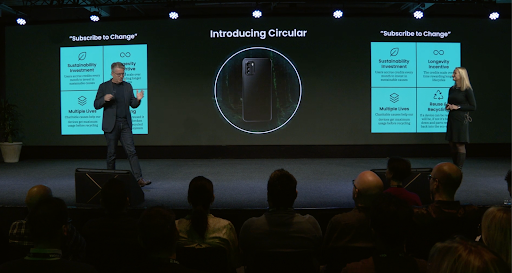By: Tom Krackeler, Chief Customer Officer at Zuora
Corporate sustainability initiatives have shifted from a “nice to have” to a necessity. As people hold companies accountable to higher standards, and reflect this in their purchasing habits, businesses around the world are increasingly focused on how to do better for the planet.
Certain companies, including some of our own customers, are even rethinking their business models to meet these rising expectations. For example, a subscription model can help a company participate in the Circular Economy, where products are intentionally designed to be better reused and repurposed, thus reducing energy and material usage, decreasing the impact on our landfills. Other companies are tapping into subscriptions to make processes like recycling almost effortless, while analyzing disposal behaviors that minimize waste.
Here are a few of my favorite examples of Zuora customers that are tapping into recurring revenue business models in conjunction with their more environmentally-friendly practices.
HMD Global, the home of Nokia phones
I recently got the chance to spend a day at the Northern European Monetization Summit with Per Ekman, Chief Commercial Officer at HMD Global, where he took a packed audience through the creative and compelling business case he is pioneering for Circular.

Circular is a revolutionary new subscription service for Nokia phones. With this new service, consumers no longer need to buy a phone – instead, they subscribe to it. The subscription model helps keep devices out of the landfill and prolongs the lifetime of the phones. Subscribers are incentivized to hold onto their phones longer by accumulating credits or ‘seeds’ which they can use toward sustainable charities and causes, such as planting trees or cleaning rivers. If 1 million people held onto their Nokia X30 5G for an extra year, they would save the same carbon dioxide equivalent as what is needed to power 5,253 homes for a whole year. And when a phone is returned (such as to upgrade to a new model), it will receive receives a second life – by either providing it to another subscriber, or donating it to be refurbished and reused.
“To be truly circular, the mobile phone industry needs to take full responsibility for the entire lifecycle of phones, not just by making sure they last longer but ensuring they are reused and recycled,” said Per Ekman, Chief Commercial Officer at HMD Global. “Circular does this by taking on the full lifecycle of the devices it offers, and that is what makes it a true part of the circular economy. We’re excited to see it grow with our users over the coming months and years, and to see the impact we can make together.”
Recygo
Recygo provides companies with subscription-based recycling services, including sorting equipment, employee support, collection, and more. Since 2018, Recygo has managed the sorting, collection and recycling of waste from almost 20,000 offices, collecting more than 100 tons of paper every day. Recygo customers also have access to data on the quantities of waste they’ve collected and recycled, to better understand the impact of their own corporate, social and environmental responsibility initiatives.
“Although it’s not traditional to recycle through a subscription service, moving to this business model allows us to offer more flexibility and tailor services to our customers’ needs,” said Corinne Sieminski, President of Recygo. “Through subscriptions, businesses can reduce their carbon footprint in an extremely simple way and dramatically save time on their recycling programs.”
Acer
Sustainability has been a long-time priority for Acer, one of the world’s top Information and Communications Technology (ICT) companies with a presence in more than 160 countries. Its device-as-a-service (DaaS) program empowers users to subscribe to cutting-edge hardware, a complete productivity software suite, secure shareable cloud storage solutions, and in-house award-winning support. The service is also helping Acer move toward a Circular Economy with options for device trade-ins and smart financing programs, which can extend the lifetime of hardware by 3 years or more, while promoting a second life for devices at the end of the contract. Its product portfolio is also fully certified for multiple ecolabels including EPEAT, TCO and ENERGY STAR.
“Shifting people’s mindsets from ownership to usage or pay-per-use with their devices is not just an opportunity to extend the lifetime of hardware products – it’s also an opportunity to create a more responsible society,” said Mailin Jappe, Director of XaaS at Acer. “By subscribing, businesses can extend the life of their products without needing to worry about the age of their products. Plus, DaaS can provide businesses flexibility as they need to grow or reduce their IT operations without heavily impacting their warehouses.”
Working Toward a Better World at Zuora
Zuora’s own Environmental, Social and Governance (ESG) efforts are also fostering more sustainable practices. Zuora recently launched an official ESG program, conducted our first-ever carbon footprint for Scope 1, 2, and 3 emissions, and released our inaugural ESG Impact Report, where we shared that we are proud to be carbon neutral as of fiscal year 2022 with a commitment to maintain it moving forward. We will continue to do our part to tackle climate change and are focused on taking steps to reduce our internal footprint.
And this year, in partnership with Village Capital, we launched Sustainability Subscribed, an accelerator program for startups creating solutions to fight climate change through subscription models. After narrowing it down to nine finalists, the top two pitches will receive a $50,000 investment from Zuora to continue their work in helping to preserve the planet. More to come when the winners are announced in early November!
Whether it’s through individual action, corporate governance initiatives or business model transformation, the Subscription Economy is enabling companies to work toward a more sustainable future.